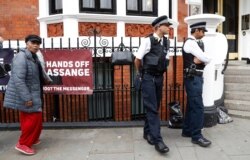The Justice Department has formally asked Britain to extradite WikiLeaks founder Julian Assange to the United States to face charges related to his release of a massive trove of secret diplomatic cables and war logs, a U.S. official said on Tuesday.
A formal request for Assange’s extradition was delivered to British authorities last Thursday, just days before a June 11 deadline.
Under an extradition treaty with the United Kingdom, the U.S. had 60 days from the date of Assange’s April 11 arrest in London to file a formal request for his handover. The treaty bars U.S. prosecutors from charging Assange with crimes not outlined in the request, making the filing of additional counts against Assange highly unlikely.
The Australian-born computer programmer and activist is being sought to face charges in federal court in Northern Virginia that he worked with former Army specialist Chelsea Manning to unlawfully obtain and publish hundreds of thousands of reports about the wars in Afghanistan and Iraq as well as conditions within the military prison at Guantanamo Bay, Cuba.Assange had eluded arrest for seven years by holing up in Ecuador's embassy in London until Ecuadorian officials turned against him in April. After his arrest by London police, U.S. prosecutors unsealed a year-old indictment charging him with a single count of computer intrusion in connection with the publication of the secret documents. But last month, they upped the ante, accusing Assange in a new 18-count superseding indictment of violating the 1917 Espionage Act by distributing classified information.
Assange, 47, faces up to 10 years in prison for each of the new charges.
The Espionage Act was enacted by Congress to deter spies from passing secret information to foreign governments. The last time a grand jury returned an indictment under the law the U.S. was at war with Nazi Germany.
The espionage charges against Assange have raised questions over whether his work constitutes journalism and should be protected under the First Amendment. Assange contends that WikiLeaks provides “national security journalism” and that he’s being targeted for his work as a journalist. But U.S. officials say they don't see Assange as a journalist and that he’s been charged for distributing confidential defense information and revealing the names of secret informants.
Yet it remains far from certain that Assange will stand trial in the United States. That is because the U.S.-U.K. treaty prohibits extradition for the specific charges Assange faces, according to legal experts.
“Espionage is generally considered a political offense, and the treaty forbids extraditing someone charged with political offenses,” John T. Nelson, a legal fellow at the Just Security blog, wrote recently.
Assange founded WikiLeaks in 2006 as “an intelligence agency of the people." To obtain secret documents to publish on his website, he “repeatedly encouraged sources with access to classified information to steal and provide it to WikiLeaks to disclose,” prosecutors wrote in the superseding indictment.
The WikiLeaks founder took refuge at the Ecuadorian embassy in London in 2012 to avoid extradition to Sweden to face sex crime allegations made by two women. A Swedish court ruled last week that Assange should not be extradited to Sweden but should still be questioned in the case while he is imprisoned in Britain.

